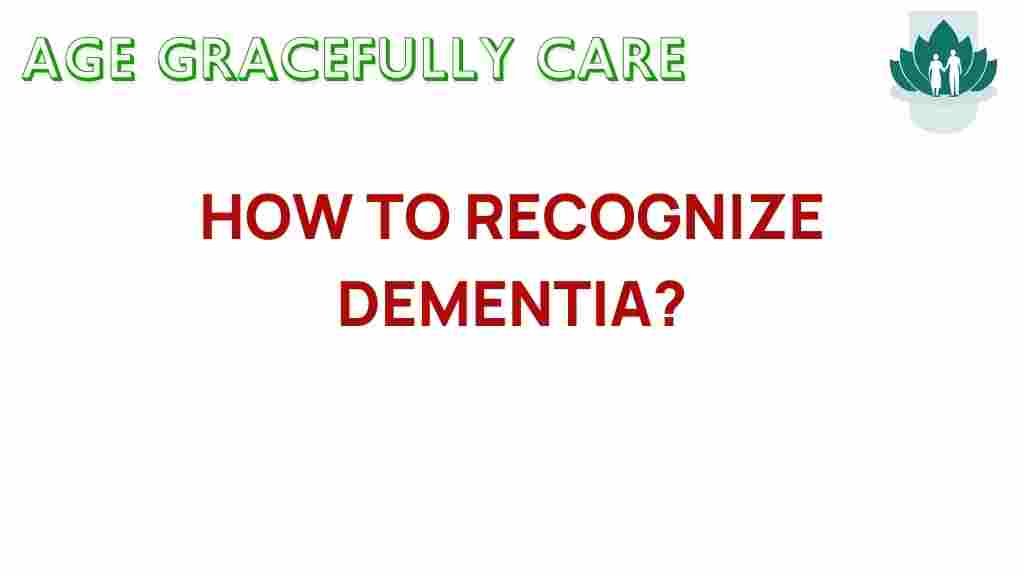Unveiling the Signs: How to Recognize Dementia Early
Dementia is a term that encompasses a variety of neurological disorders, characterized by a decline in cognitive function severe enough to interfere with daily living. As the population ages, understanding the early signs of dementia becomes increasingly crucial for effective elderly care and caregiving. Early detection can lead to better management strategies, improved quality of life, and more informed decisions regarding health awareness. In this article, we will explore the early signs of dementia, the implications of memory loss, and actionable steps for caregivers and families.
Understanding Dementia and Cognitive Decline
Dementia is not a single disease but a general term that describes a group of symptoms affecting memory, thinking, and social abilities. The most common cause is Alzheimer’s disease, but other forms include vascular dementia, Lewy body dementia, and frontotemporal dementia. Recognizing early signs of cognitive decline is essential for timely intervention.
Identifying Early Signs of Dementia
Early signs of dementia can be subtle and may be mistaken for normal aging. However, being aware of these signs can aid in early diagnosis and treatment. Here are some common indicators to watch for:
- Memory Loss: Forgetting recent conversations or events can be a red flag. This is not just typical forgetfulness, but a consistent pattern of memory loss.
- Difficulty with Problem-Solving: Struggling to plan or organize tasks, like following a recipe or managing finances, can indicate cognitive decline.
- Challenges in Language: Finding the right words can become increasingly difficult. This may manifest as frequent pauses or substitutions when speaking.
- Disorientation: Losing track of time or place, such as getting lost in familiar surroundings, is another sign of cognitive issues.
- Changes in Mood and Personality: Sudden shifts in mood, increased anxiety, or withdrawal from social activities may signal cognitive decline.
- Decreased Judgment: Poor decision-making or neglecting personal hygiene can be alarming signs.
Recognizing these early signs is vital in addressing potential health issues proactively. If you or a loved one is experiencing these symptoms, it is crucial to consult a healthcare professional for a thorough evaluation.
Step-by-Step Process for Early Detection
Identifying dementia early involves a systematic approach. Here’s a step-by-step guide:
- Observe Behavior: Keep an eye on any noticeable changes in memory, mood, or daily functioning.
- Document Symptoms: Maintain a record of specific instances that illustrate cognitive decline, such as forgetfulness or confusion.
- Engage in Communication: Open a dialogue with the individual experiencing symptoms. Approach the conversation with care and empathy.
- Consult with Healthcare Professionals: Schedule an appointment with a doctor specializing in neurology or geriatrics for a comprehensive assessment.
- Undergo Cognitive Testing: Professionals may recommend cognitive tests to evaluate memory, problem-solving, and language skills.
- Explore Diagnostic Imaging: In some cases, imaging tests like MRI or CT scans may be necessary to rule out other conditions.
Following these steps can help identify dementia in its early stages, allowing for timely intervention and support.
Tips for Caregivers and Families
As loved ones begin to show early signs of dementia, caregivers often face unique challenges. Here are some tips to assist in caregiving:
- Educate Yourself: Understanding dementia and its progression can better equip caregivers to handle the emotional and practical aspects of caregiving.
- Establish Routines: Consistent daily routines can provide structure and comfort for individuals experiencing cognitive decline.
- Encourage Engagement: Promote activities that stimulate the mind, such as puzzles, reading, or memory games.
- Maintain Communication: Use clear, simple language, and be patient. Listen actively to what the individual is saying.
- Seek Support: Join support groups for caregivers, where you can share experiences and receive guidance from others in similar situations.
Being proactive and informed can make a significant difference in the lives of both caregivers and those experiencing early signs of dementia.
Health Awareness and Early Intervention
Raising health awareness about dementia is crucial not just for individuals but also for communities. Understanding dementia helps reduce stigma and encourages open discussions about cognitive health. Early intervention can lead to:
- Better Quality of Life: Individuals diagnosed early can engage in planning their care and treatment options.
- Improved Support Systems: Families can prepare emotionally and financially for the journey ahead.
- Enhanced Research Opportunities: Increased awareness can lead to greater funding and research for treatment options and potential cures.
For more information on neurological disorders and support resources, you can visit Alzheimer’s Association.
Troubleshooting Tips for Common Challenges
Caregivers may encounter various challenges when managing the care of individuals showing early signs of dementia. Here are some troubleshooting tips for common issues:
- Communication Barriers: If the person struggles to communicate, try using visual aids or written instructions to facilitate understanding.
- Behavioral Changes: If mood swings or aggression occur, maintain a calm demeanor and try to redirect the individual’s attention to a comforting activity.
- Refusal of Care: If the individual resists assistance, approach them gently, explaining the importance of the help you are offering.
- Safety Concerns: If safety becomes an issue, consider modifying the living space by removing hazards or installing safety devices.
Addressing these challenges proactively can help maintain a supportive environment for those experiencing dementia.
Conclusion
Recognizing the early signs of dementia is a critical step in supporting those affected by cognitive decline. By understanding the implications of memory loss and cognitive changes, caregivers and families can take proactive measures to improve the quality of life for their loved ones. Through education, open communication, and community support, we can enhance health awareness and foster a more supportive environment for those facing the challenges of dementia. Remember, early intervention can make a significant difference—stay informed, and take action.
For more resources and support, consider visiting this informative site dedicated to dementia care.
This article is in the category Health and created by AgeGracefullyCare Team
